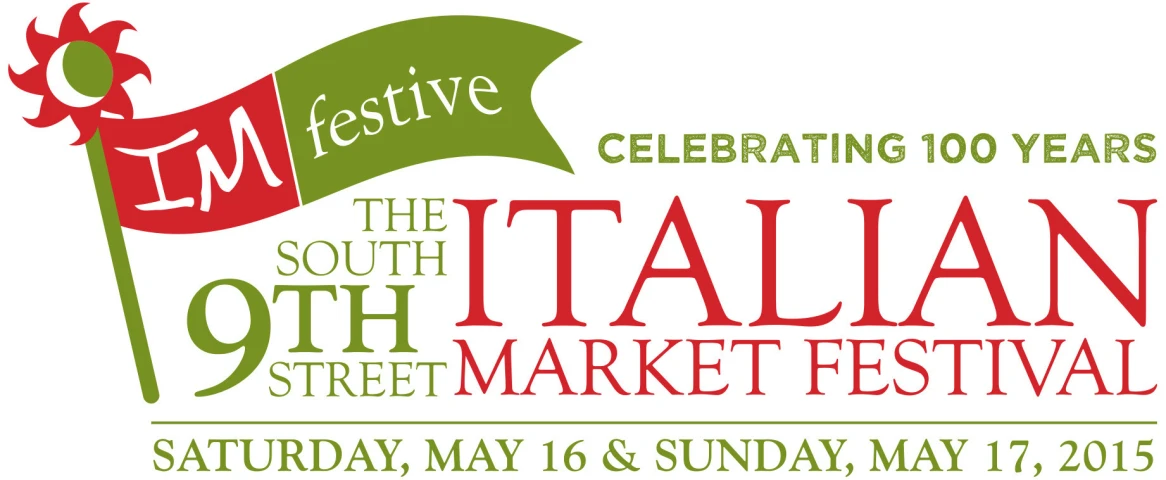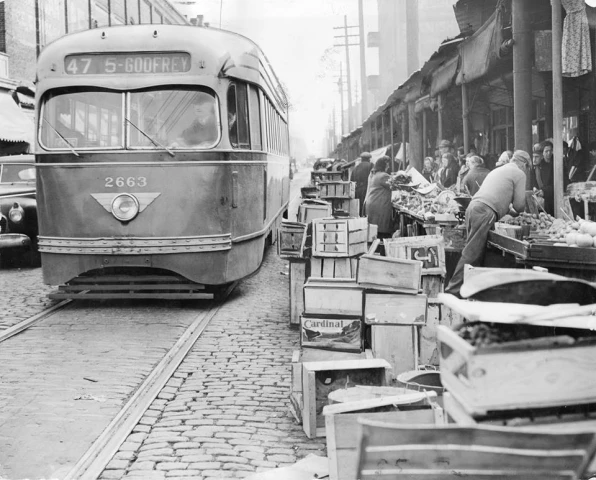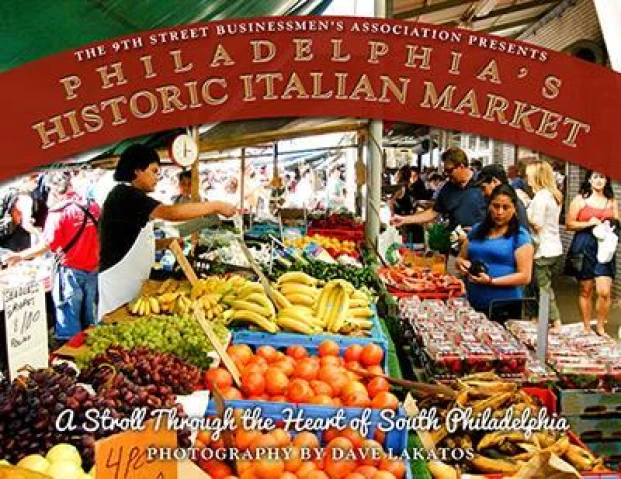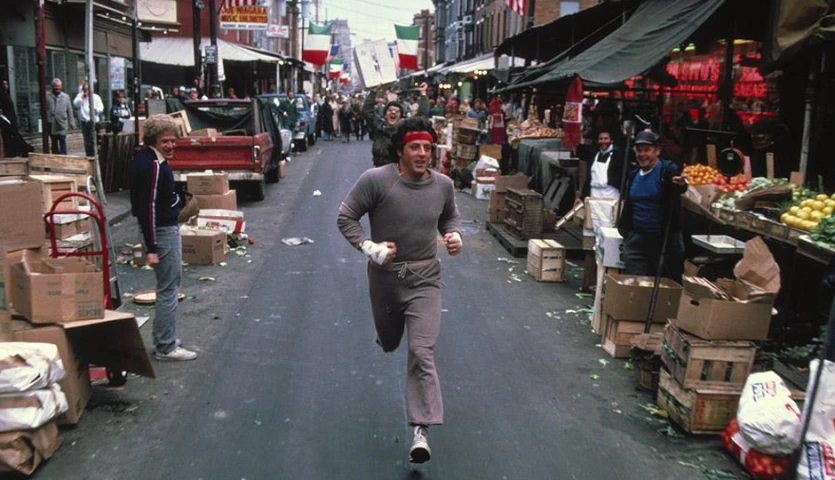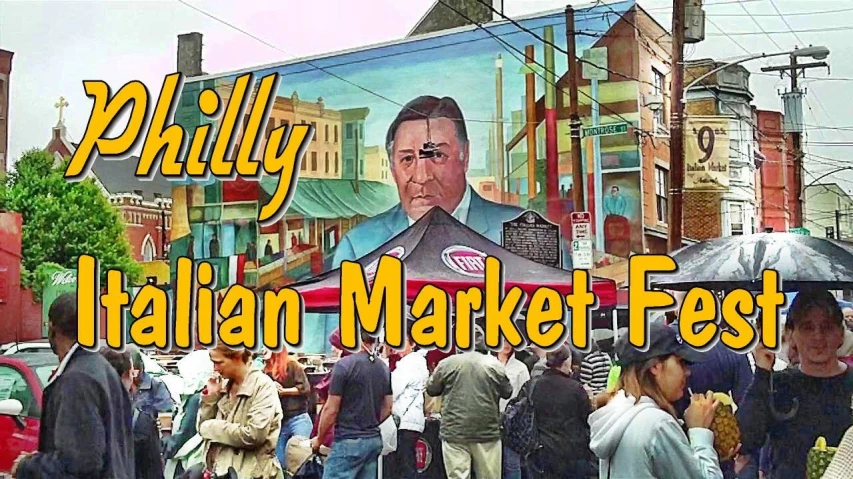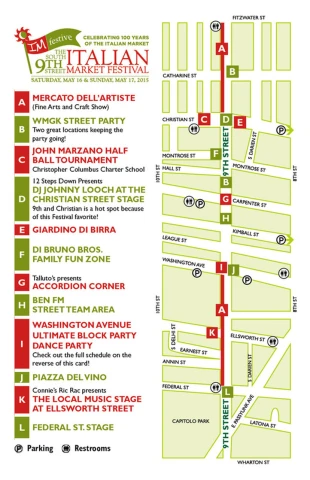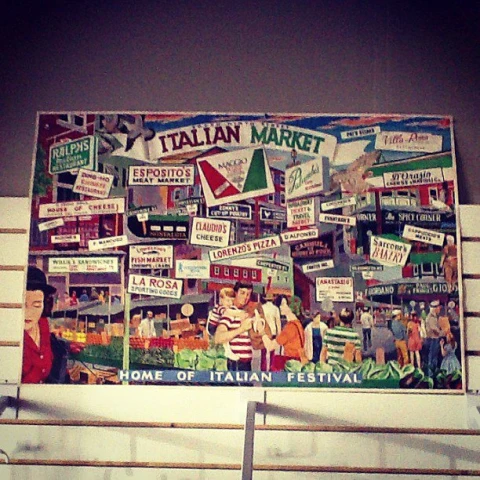During the years of mass emigration from Italy to the US, one of the peculiarities of the Little Italies all over the US definitively was the street market. Many used to spend several hours on the street: people would work hard, start their small business, socialize with other "paisanos", meet friends and maybe future spouses, get a life away from problems and crime. Food was the one need that the Italians could not escape from, while living a very basic life with no luxury at all, saving money to be sent back home, maybe to get their families to join them to the US, or simply to survive in their new country.
In time most of these street markets ended, for several reasons: people moved from the Little Italies, they could afford better places, cities got new urbanizations, trade changed its rules. But one place is still up and running pretty good, and celebrates this year – right now, on May 16th - its 100th anniversary: it is America's oldest outdoor market and we're talking about Philadelphia's 9th Street Italian Market. That's why we're happy and proud to host as our guest the President of the association which runs the market, our friend Domenick Crimi.
Domenick, first of all please tell us something about you. You are the President of the South 9th Street Business Men's Association, but you're also a firefighter. So let us thank you for your service in both the areas ...
I grow up in this district. My parents, my brother, myself and my sisters ... all my family had been living working in the district. About that time I graduated in high school I had a neighbor who was a firefighter and he asked me how old I was; I was 17 so he said: "When you turn 18 why don't you come down and join the firehouse?". So, I went and I joined the firehouse and now I'm 54 and I'm still involved and I love it. I'm a volunteer: we have the same qualification as a full time paid professional firefighter, but we don't sit in the station all day long and get paid. We do our normal jobs, and when they call us if we're available we join them. Now I've moved and so I'm not able to help as many times as before; but anyway, that's the firefighter part of me. I really enjoyed it!
I also have had a career as a professional photographer, about 5 years after college. Then, in 2005, my wife convinced me to change my career ... I was working two days a week in the butcher shop, and she convinced me to come back full time. My parents were getting older, turning 80 at that time, and somebody needed to take over the business.
My dad had been President of the Association from the late 50s to the late 80s, and when he gave up being President the Association started doing not that much. The street was like there was no promotion, it wasn't active at all. So we had meetings, we reorganized the association and about 8 years ago I became President.
The 9th Street Italian Market is about to celebrate its 100th birthday. It is America's oldest outdoor market! Please tell us something about this fantastic place, from the origin through the decades
The market now runs about 8/10 blocks in length and 3 blocks in width and it has a variety of different businesses. The most part of the businesses that stand out are the curb stands: they are on wheels that are at the curb facing the sidewalk, from the street while traffic flows behind them. They are on the east side of the street: years ago they switched side every six months but it was too difficult and so they decided to have stands on the east side and parking on the west side of the street. Most of those stands are for fruit and vegetables, and the some stands sell food, and others sell flowers.
There's a few coffee shops with an area for people to sit, tables and chairs to have coffee, lunch and whatever. There's awnings over the stands which get roll up at night ... and this area is the most visible part of the market: when you come down the street that's what you see. Then of course there's permanent awnings over the sidewalks and that's where the store businesses are: most of them are owned by families and passed on from generation to generation: some families have been here since late 1890, the early 1900.
In the 1890s Frank Palumbo opened up a boarding house to take in immigrants that were coming here from Italy, as a place to stay. Many people came, many families: they needed food. So, one by one the stores opened up: at first they were fruit and vegetables stands, then somebody opened a butcher shop and then others. Gradually they started taking in a person, somebody who emigrated from Italy, around the WW1 era, giving them a place to stay, to learn and train how to do the job.
So, in the early 1900 a lot of people, especially from Sicily like my grandfather (from Messina), came here and got together with other "paisanos": my grandfather started working in a butcher shop, while my grandmother's family, who were from Palermo, had a food stand. That's where my grandparents met and eventually when they decided to get married, and that happened to several other Italian people who met in the 9th street market. So the man of the shop where my grandfather was working told him: "Man, this place of the street is for sale, you go and buy it and you start your own business": that too happened to many people. Family members started to join their business when they were young: my brother and I started when we were 5.
America used to have a lot of markets like this, in the Little Italy spread all over the US cities. Why do you think this one survived, while others had to close? What made it so special?
I think it survived over the years for two reasons. The first is because many stores passed from generation to generation staying in the family; the second is because of the new immigrants coming to America. You know, when you work with your hands, you want your children to do better than you. So, in America everybody wants their children to become lawyers, doctors, accountants: they send them to college and think "Ok, you're going to get a job": this happened to me, I went to the college, I worked uptown, I started my own photography business ... but then I came back. I'm 54: a lot of people of my age, whose families owned a store in the market, found bigger and better jobs: the job on the market is difficult, you get no break, cold in the winter, hot in the summer, standing outside on the stands ... so, they grew up and decided they were going to college and find a job outside the market, in the business world.
So, new immigrants came to the United States: in the 80's Koreans came, and then the Mexicans came down to the Italian market, and they found opportunities. The older generations still owned the stands, the stores, the properties, but some of them didn't have somebody to pass them on: so the new immigrants went and got those jobs, and then opened their own stand or store. So, while we used to have 100% Italian stands, maybe now we have 50%. These are hardworking people, all very nice, we all get along: many of them consider each other a family, in a certain way.
I hear that the celebration will start now and will go on until the end of the year. Which activities are you organizing?
The biggest event is coming up on May 16th and 17th, the Italian Market Festival: we close the street off to traffic and we bring in lots of vendors, music and entertainment and goes all way with the market. For instance in my store, Cappuccio's Meats, I make 29 flavors of homemade Italian sausage! For the festival we pick the 8 most favorite, we put a station outside the store, in the street, and we grill and sell sausages. A lot of Italian stores take the show on the road: what they do in their store, they manage to put it outside on the street for the festival.
Then, we're doing a little something every month after that, to keep celebration going on. In June we're having food trucks, with the award to the best one from the Food Truck Association: we'll close the street to traffic and there'll be just food trucks, so people can experience something different.
In July we're going to have a multicultural music month, with many different musicians. In August we're going to have Bocce and Scopa tournament, during the whole month.
The next biggest event after that will be the Columbus festival, which we call "Salute Columbus": it's almost like the regular festival, and that'll be will be on Saturday October 10th, a one day festival with food, drinks and entertainment.
Is there a parade?
The city does a parade the next day, on Sunday, but not here in the market: it's big, organized by the Sons of Italy, starts 5 blocks from here and runs south. In my shop I do both the events.
You also have a project called "Vision 2020". What is the future of this historical place, according to the South 9th Street Business Men's Association?
We think that the vision for the future is to really make the market a place to visit: we want the people who come to Philadelphia to say "let's go visit the Italian market", something very unique. Our vision is to keep the market with family stores, and also multicultural: Philadelphia is a multicultural city and so the market has to stay.
In September Pope Francis will be visiting Philly. Is he coming to the market? Are you preparing something special?
We would like to have him here! It probably won't be possible because of the security concerns, and because we know he has a very tight schedule. He's going to be here just for two days, and he probably will have a big mass in the center of the city. We'll probably get a lot of visitors coming to Philadelphia.
You meet and serve a lot of people at the market. Are there a lot of Italians who just recently arrived to Philly?
I've had a few in the past weeks: I wouldn't say a lot. Some of them are visiting, some just recently moved in the city, some of them come in the weekend, like my parents do: they still work on the weekends! My mother is 89 and my dad in summer will be 90.
Still working at 89 or 90, that's something! You know, this is not the first time I've been told that Italian Americans keep working even at that age: I think there's a pattern here, and it's interesting because here in Italy things are very different. These aged Italian Americans probably used to work very hard their entire life and they still keep themselves busy: I feel an enormous respect for all of them ...
Well, you know, when you come to the Italian market you know you're going to be working very hard. Retirement is very difficult to do because you need to pass the business on to somebody: so, unless you sell out you're going to be working for the rest of your life. My mother is was born here, my grandparents came here from Italy and started the business. When my sister would ask her "Why don't you retire, move to Florida and rest, something like this?" my mother always told her "I'm fine, this is where I belong. I need to work. I keep busy and I see my people: the customers, who become friends over the years." I think if keep working it keeps your brain going. If you retire, doing nothing will kill you!
I agree with you, and that's an example of how hard the Italians have been working their whole life, here in the US. In the end, let's talk about food. To you, why is food so important for the Italian American community?
I think that food is life to us, is what we do. When our families get together, food is always involved, in every Italian house in America, especially on Sundays: because we grew up with big family meals.
Which is the most popular Italian food in the 9th Street Italian market?
Well, I'm going to speak for myself ... if you think in terms of shopping food to take it home and eat it there, I think one of the most popular foods would be sausage, because they know that here they only get fresh and natural meat. If you think about eating here, in restaurants, I would rather say pasta.
Durante gli anni dell'emigrazione di massa dall'Italia verso gli Stati Uniti, una delle peculiarità delle Little Italy in molti degli Stati Uniti erano i mercati di strada. Molti trascorrevano molto tempo in strada: gli italiani lavoravano molto duramente, iniziavano a mettere su un piccolo business vendendo cibo, socializzavano con gli altri compaesani, incontravano amici e magari la futura moglie o marito, si tenevano lontani dai problemi e dalla criminalità avere una vita lontano dai problemi e della criminalità. Gli italiani si privavano di molte cose ma non del cibo, pur vivendo una vita molto semplice, senza alcun lusso, risparmiando denaro da inviare a casa, magari per permettere alle loro famiglie di raggiungerli in America o semplicemente per sopravvivere nel loro nuovo paese.
Con il tempo la maggior parte di questi mercati è sparita, per diverse ragioni: gli Italiani hanno lasciato le Little Italy per andare a vivere in posti più spaziosi, le città hanno sviluppato nuove urbanizzazioni, il commercio ha cambiato le sue regole. Ma un mercato di strada è ancora attivo e funzionante molto bene, e celebra quest'anno - il 16 maggio - il suo 100° anniversario: è più antico mercato all'aperto d'America e stiamo parlando del 9th Street Italian Market di Philadelphia. È per questo che siamo felici e orgogliosi di ospitare come nostro ospite il Presidente dell'associazione che gestisce il mercato, il nostro amico Domenick Crimi.
Domenick, prima di tutto dicci qualcosa su di te. Sei il presidente della South 9th Street Business Men's Association, ma sei anche un vigile del fuoco. Il nostro ringraziamento per te quindi è duplice ...
Sono cresciuto in questo quartiere. I miei genitori, mio fratello, io e le mie sorelle ... tutta la mia famiglia ha vissuto e lavorato nella zona del 9th street market. Quando stavo finendo il liceo un mio vicino, vigile del fuoco, mi chiese quanti anni avevo: ne avevo 17, così mi disse: "Quando compi 18 anni, perché non vieni a trovarmi alla caserma e ti unisci a noi?". Così, andai e mi iscrissi al corpo dei vigli del fuoco e ora che ho 54 anni sono ancora coinvolto e mi piace molto. Oggi sono un volontario: abbiamo la stessa qualifica dei vigili del fuoco professionisti a tempo pieno, ma non operiamo dalla caserma dei vigili. Facciamo un altro lavoro, e quando ci chiamano - se siamo disponibili - ci uniamo agli altri. Ora ho cambiato casa e quindi non sono in grado di aiutare come prima; ma in ogni caso, questa è la parte di me che sempre sarà un vigile del fuoco. E' una cosa che mi piace molto.
Ho anche avuto una carriera come fotografo professionista, circa 5 anni dopo il college. Poi, nel 2005, mia moglie mi ha convinto a cambiare mestiere ... lavoravo due giorni a settimana nella macelleria che abbiamo, e lei mi ha convinto a tornare a tempo pieno. I miei genitori arrivavano intorno agli 80 anni in quel momento, e avevano bisogno che qualcuno prendesse in mano il negozio di famiglia.
Mio padre era stato dalla fine degli anni '50 alla fine degli anni '80 Presidente dell'Associazione di negozianti che gestisce il mercato, e quando lasciò l'Associazione iniziò un periodo in cui non molto veniva fatto. Era come se il mercato non avesse più alcuna promozione, non c'erano grandi attività. Così con alcuni altri negozianti ci incontrammo, riorganizzammo l'associazione e circa 8 anni fa sono diventato Presidente.
Il 9th Street Italian Market sta per celebrare il suo 100° compleanno. E' il più antico mercato all'aperto d'America! Ti chiediamo di descrivere brevemente ai nostri lettori questo storico luogo
Il mercato copre circa 8/10 isolati in lunghezza e 3 in larghezza ed ha una grande varietà di negozi. Molti punti vendita sono su ruote: sostano sul lato a est della strada, rivolti verso il marciapiede, mentre il traffico scorre dietro di loro. Anni fa si cambiava lato della strada ogni sei mesi, ma era troppo complicato e così si è deciso di avere i punti vendita sul lato est, e i parcheggi sul lato ovest. La maggior parte di questi stand sono per la frutta e la verdura, alcuni altri vendono cibo, e altri vendono fiori.
Ci sono un paio di caffè con uno spazio per le persone a sedere, tavoli e sedie per bere o mangiare qualcosa. Ci sono tende da sole sui punti vendita su ruote... e questa zona è la parte più visibile del mercato: quando si arriva dal fondo della strada questo è ciò che si vede. Poi naturalmente ci sono i negozi permanenti che hanno le vetrine che si affacciano sui marciapiedi: la maggior parte di loro sono di proprietà di famiglie che se li tramandano di generazione in generazione, alcune famiglie sono qui dalla fine del 1890 o i primi del 1900.
Nel 1890 Frank Palumbo aprì un punto di accoglienza per gli immigrati che venivano qui dall'Italia. Arrivavano in molti, e anche molte famiglie: avevano bisogno di cibo. Così, uno ad uno si aprirono vari negozi: in un primo momento erano solo stand di frutta e verdura, poi qualcuno ha aperto una macelleria e poi anche gli altri. A poco a poco hanno iniziato ad assumere qualcuno che li aiutasse, un immigrato dall'Italia, intorno al periodo della prima guerra mondiale, dandogli un posto dove stare, in cui imparare un mestiere e guadagnarsi qualcosina.
Così, nei primi anni del 1900 molta gente, soprattutto dalla Sicilia come mio nonno (più precisamente da Messina), venne e si riunì con altri compaesani: mio nonno iniziò a lavorare in un negozio di macelleria, mentre la famiglia di mia nonna, che era originaria di Palermo, vendeva cibo in generale. I miei nonni si conobbero qui, e qui decisero di sposarsi: è successo così per tante altre famiglie italiane, che si sono create nel 9th street market . Il proprietario del negozio dove mio nonno lavorava, un giorno gli disse: "C'è un negozio qui vicino che è in vendita, vai e compralo, e inizia una tua attività": anche questa è una storia che è accaduta a molti italiani di qui. I membri della famiglia spesso iniziavano a dare una mano in negozio sin da piccoli: io e mio fratello avevamo 5anni quando iniziammo ad aiutare.
In America una volta c'erano molti mercati come questo, nelle Little Italy di moltissime parti degli Stati Uniti. Perché pensi che questo in particolare sia sopravvissuto, mentre altri hanno dovuto chiudere? Che cosa lo ha reso così speciale?
Penso che sia sopravvissuto nel corso degli anni per due motivi. Il primo è perché molti negozi sono passati di generazione in generazione, all'interno delle famiglie. Il secondo è a causa dei nuovi immigrati arrivati in America. Quando si lavora con le mani, a contatto con la clientela ogni giorno, si ha il desiderio che i propri figli facciano meglio di te, abbiano più opportunità. Così, in America tutti vogliono che i loro figli diventino avvocati, medici, professionisti nel mondo degli affari: li mandano a scuola e pensano "Ok, così troverai un buon posto di lavoro". A me è accaduto proprio questo: sono andato al college, ho iniziato la mia propria attività fotografia ... ma poi sono tornato qui. Molte persone della mia età, le cui famiglie possedevano un negozio nel mercato, hanno fatto una carriera lontano da qui, con lavori più prestigiosi e meglio retribuiti: lavorare nel mercato è difficile, non hai mai soste, lavori nel freddo in inverno e nel caldo in estate, sempre in piedi per servire la tua clientela.
Ma nuovi immigrati arrivarono negli Stati Uniti, e nel 9th street market: negli anni '80 furono i coreani, e poi dopo i messicani, e trovarono diverse opportunità. Le vecchie generazioni ancora avevano la proprietà degli stand e dei negozi, ma alcuni di loro non avevano un familiare a cui insegnare il lavoro e poi passare l'attività: così lo fecero con i nuovi immigrati, che poi aprirono il loro stand o negozio. Così, mentre un tempo il 100% dei commercianti di qui era italiano, oggi lo è solo il 50%. Sia chiaro: gli altri sono tutta gente che lavora duro, brave persone con le quali c'è grande armonia: con molti di loro ci consideriamo reciprocamente di famiglia, in un certo senso.
Vedo che le celebrazioni per il centenario iniziano ora e andranno avanti tutto l'anno. Cosa state organizzando?
L'evento più grande è quello del 16e 17 maggio, l'Italian market Festival: chiudiamo la strada al traffico e portiamo molti venditori, musica e spettacolo e il festival copre l'intero mercato. Per fare un esempio, nel mio negozio di carne, Cappuccio's Meats, noi prepariamo 29 tipi di salsiccia italiana fatta in casa! Per la festa selezioniamo gli 8 tipi preferiti, mettiamo una postazione fuori dal negozio e le cuociamo e vendiamo per strada. Molti altri negozi fanno lo stesso, praticamente trasferiscono la loro attività al di fuori del negozio, nei giorni del festival.
In seguito, ogni mese organizzeremo eventi, per mantenere le celebrazioni per tutto l'anno. Nel mese di giugno avremo i camioncini che vendono cibo, che sono una tradizione americana: verrà premiato il migliore dalla Food Truck Association. Anche in questo caso chiudiamo la strada al traffico, e ci saranno solo camioncini che preparano e vendono il loro cibo. Così la gente può sperimentare qualcosa di diverso.
Nel mese di luglio avremo un mese di musica proveniente da diverse culture, con molti musicisti di diversa provenienza. Nel mese di agosto invece avremo i tornei di bocce e di scopa, che dureranno tutto il mese.
Poi, il successivo grande evento sarà il Columbus Festival: è simile al festival che organizziamo a maggio, e si terrà sabato 10 ottobre: durerà un giorno e anche lì si potrà mangiare, bere e divertirsi in abbondanza.
Organizzate anche una parata, in quell'occasione?
La città ha una parata il giorno dopo, la domenica, ma non qui nel mercato: è grande, organizzata dai Sons of Italy, inizia a 5 isolati da qui e si snoda verso sud. Con la mia attività noi partecipiamo ad entrambi gli eventi.
Avete anche un progetto chiamato "Vision 2020". Qual è il futuro di questo luogo storico, secondo la South 9th Street Business Men's Association?
La nostra visione per il futuro è quello di rendere davvero il mercato un luogo da visitare: vogliamo che le persone vangano a Philadelphia anche per dire "una delle cose che vogliamo visitare è l'Italian Market", qualcosa di veramente unico. La nostra visione è quella di mantenere il mercato con negozi a conduzione familiare, e anche multiculturale: Philadelphia è una città multiculturale e quindi il mercato deve rimanere tale.
Nel settembre del Papa Francesco visiterà Philly. Verrà anche a visitare l'Italian Market? State preparando qualcosa di speciale?
Ci piacerebbe tanto averlo qui! Probabilmente non sarà possibile a causa dei problemi di sicurezza, e perché sappiamo che ha un calendario molto serrato. Sarà a Philadelphia solo per due giorni, e probabilmente celebrerà una grande messa nel centro della città. Certamente avremo molti visitatori che verranno a trovarci in quella occasione.
Tu entri in contatto con molte persone, grazie al tuo lavoro. Ti capita di avere come clienti molti Italiani solo recentemente arrivati a Philadelphia?
Ne ho avuti alcuni nelle ultime settimane: ma non molti, a dire il vero. Alcuni di loro sono turisti, altri si sono da poco trasferiti qui, alcuni di loro vengono nel fine settimana, come fanno i miei genitori, che nei weekend ancora lavorano con me! Mia madre ha 89 anni e mio padre in estate ne farà 90.
A quella età si tengono ancora in attività! Sai, questa non è la prima volta che mi viene detto che gli italoamericani continuano a lavorare anche a tarda età: penso che non sia un caso, ed è interessante perché qui in Italia le cose sono molto diverse. Probabilmente gli italoamericani hanno sempre lavorato molto duramente per tutta la loro vita, e non sanno come passare il loro tempo senza tenersi impegnati: sento un enorme rispetto per tutti loro ...
Beh, sai, quando arrivi all'Italian Market sai che dovrai lavorare molto duramente. E' molto difficile andare in pensione, perché è necessario passare il business a qualcun altro: così, a meno che non si vende e ci si ritira, c'è possibilità di dover lavorare per tutta la vita. Mia madre è nata qui, i miei nonni sono venuti qui dall'Italia e hanno iniziato l'attività. Quando mia sorella le ha chiesto "Perché non vai in pensione, magari ti trasferisci in Florida e ti riposi, o qualcosa del genere?", mia madre le ha sempre risposto "Sto bene, il mio posto è qui. Ho bisogno di lavorare. Mi tengo occupata e vedo la mia gente: i clienti, che diventano amici nel corso degli anni". Credo che continuare a lavorare mantiene il cervello in movimento. Se si va in pensione senza fare nulla, si muore!
Sono d'accordo con te, e questo è un esempio di quanto sia duramente gli italiani hanno lavorato tutta la vita, qui negli Stati Uniti. Concludiamo parlando di cibo. Secondo te, perché è il cibo così importante per la comunità italoamericana?
Credo che il cibo sia la vita per noi, è ciò che facciamo. Quando le nostre famiglie si riuniscono, lo fanno sempre attorno al cibo, in ogni casa italiana in America, specialmente la domenica: perché siamo cresciuti con grandi pranzi o cene in famiglia.
Qual è il cibo più popolare nel 9th Street Italian Market?
Beh, in questo caso parlo per me ... se si pensa in termini di spesa da portare a casa e cucinare e consumare, penso che uno degli alimenti più popolari sia la carne e le salsicce, perché tutti sanno che qui trovano solo carne fresca e naturale. Se invece si parla di mangiare qui al mercato, nei ristoranti, direi che il piatto più popolare è senza dubbio la pasta.


